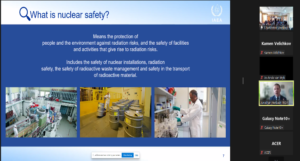On 16 and 17 February 2023 ISTC attended a hybrid meeting of nuclear experts in Accra, Ghana, convened by the African Center for Science and International Security (AFRICSIS) and funded by the United Kingdom’s Foreign, Commonwealth and Development Office (FCDO). Main topics on its agenda pertained to the incentives and external assistance to African countries to facilitate their adherence to the convention on physical protection. In fact, CPPNM is the only treaty that obligates countries to implement security measures for civilian nuclear material in international transport, criminalizes offenses associated with nuclear theft and terrorism, and establishes mechanisms for cooperation in securing international transports, responding to incidents, and extraditing suspected criminals.
 Through its nuclear projects in Africa ISTC promoted – inter alia – the effective implementation of the CPPNM and its Amendment in Africa. ISTC provided support with regard to the adherence to the Amendment of the international treaty to some of the countries the Center worked in, which have to yet join the A/CPPNM namely: Burundi, Ethiopia, South Africa, Sudan, Uganda, Tanzania, Zambia and Zimbabwe. The latter in fact joint the initial convention during the ISTC-implemented EU-funded project Support to Southern African states in nuclear safety.
Through its nuclear projects in Africa ISTC promoted – inter alia – the effective implementation of the CPPNM and its Amendment in Africa. ISTC provided support with regard to the adherence to the Amendment of the international treaty to some of the countries the Center worked in, which have to yet join the A/CPPNM namely: Burundi, Ethiopia, South Africa, Sudan, Uganda, Tanzania, Zambia and Zimbabwe. The latter in fact joint the initial convention during the ISTC-implemented EU-funded project Support to Southern African states in nuclear safety.
Ms. Brigitte Okley Ainuson, Head of the Legal Affairs Office, Ghana Atomic Energy Commission spoke before the participants about the potential relevance of the CPPNM Amendment for states without nuclear material and nuclear facilities. On the other hand Ms. Deborah Akins from the Ministry of Foreign Affairs and Regional Integration of Ghana shared lessons from a State Party to the A/CPPNM.
The forum in Accra allowed for further expanding the network among officials, regulators, and lawmakers who are working on nuclear issues within participating countries. It brought about increasing awareness of and access to the relevant legislative assistance and technical activities available to African states.

